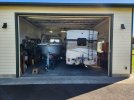- Joined
- Jul 18, 2024
- Messages
- 69
- Reaction score
- 23
- Points
- 8
- Location
- Bainbridge Island
- Website
- www.youtube.com
- Model
- Gulfstream
I'll be asking the dealer but I'd appreciate advice here. I plan to leave the Gulfstream in the water year round, and I don't know what the Puget Sound weather will be like from now until March or so.
The bottom is painted and I hope to keep the tank pretty full, with ethanol-free gas. I have shore power at the marina if I see the batteries are not fully charged. No fresh or salt water in any tanks.
I have canvas for the helm but no cover for the cockpit or over the bench seat and side bolsters. Thoughts on that?
Recommendations for running the engines, even if the conditions are suboptimal? E.g., don't let more than X days go without taking the boat out for at least Y minutes, with Z minutes on plane?
I have time to maintain the boat, but don't know what I don't know. All tips welcome.
The bottom is painted and I hope to keep the tank pretty full, with ethanol-free gas. I have shore power at the marina if I see the batteries are not fully charged. No fresh or salt water in any tanks.
I have canvas for the helm but no cover for the cockpit or over the bench seat and side bolsters. Thoughts on that?
Recommendations for running the engines, even if the conditions are suboptimal? E.g., don't let more than X days go without taking the boat out for at least Y minutes, with Z minutes on plane?
I have time to maintain the boat, but don't know what I don't know. All tips welcome.


